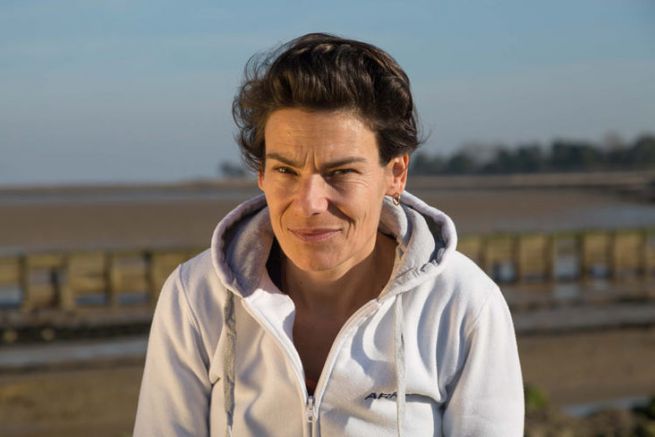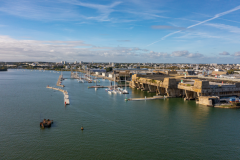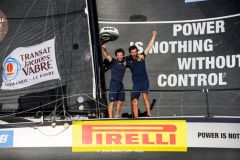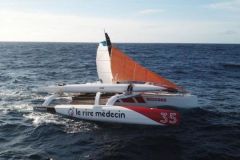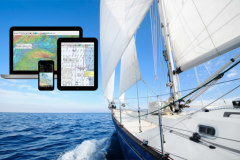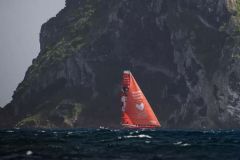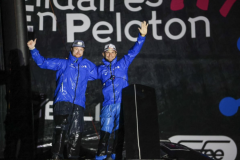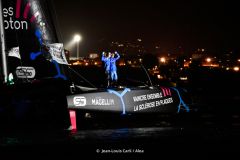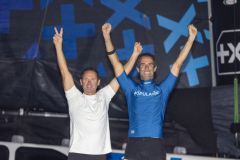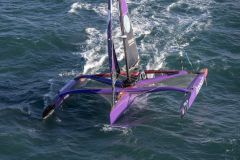Can you explain the router business?
It is first of all weather analysis and investment strategy in relation to the different possible routes. We know that when sailing a boat you can't go straight ahead, you have to tack or gybe to go looking for weather phenomena. Routing is authorised on multihulls for safety reasons because they are very fickle boats. It's a precious help for the skippers. There's so much discomfort on board that it's better to spend some time ashore to run the routing and really look at the satellite photos. In addition, they have very few means of communication on board and access is slow.
From land, they are given safety information, if a front is windy, gusty, cloudy... so that they can anticipate it; so that they can reef in time without being surprised by what will happen to them. As I'm a tactician and navigator on board, my role is also to anticipate the conditions. Routings are mathematical formulas, sometimes they are not really viable or humanly feasible. So I adjust the cursor to what is possible to do or not do depending on the weather conditions. Finally, I have a strategic placement role in relation to other competitors.
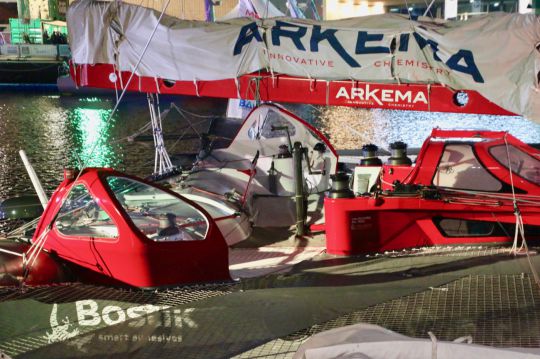
What information do you need inbound to give them the best possible routes out?
For mechanics and mathematics to work, I need polar fleeces. Good fleeces. I've been working on it all year. After the installation of the foils, the speeds have increased enormously at certain speeds. For every wind speed and direction, you need a boat speed. For that, you have to have worked on it upstream. Then you add the current: against or with, then the wind. We also work a lot on the sea state, which will degrade the results. That's a lot of parameters. You have to put the right cursors in the right places before launching the course calculator.
It is also important to choose the right weather files. There are French, European, American files... Each file is different. You can run them with or without degrading the polars. We do dozens of routings.
I'm looking at these routings in detail and I'm thinking: " this is the one I choose for them ". Both for strategic reasons, safety, comfort sometimes, ease, to mark the competitors ... But I can also say to myself: " i don't like any of them, I'm going to swivel a little bit to go there, because I feel it better ". We add human over calculus.
On the way out, I suggest a route. A finished routing, worked out that I transmit them on board with a small topo: "L to, you're gonna have to be on it, because it's gonna be complicated. Now that's cool.. "I explain to them in words what sauce they're going to be eaten.
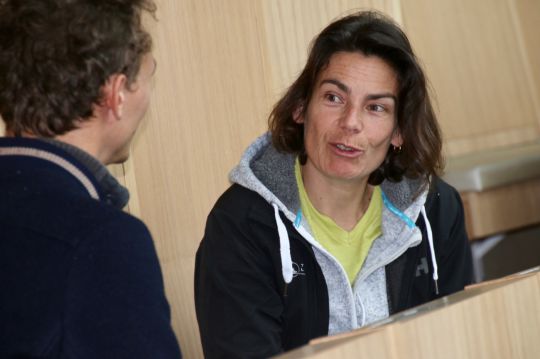
Are you adapting the route to the way skippers sail? Or is it the skippers who adapt to the route?
Instead, we're going to adapt the route to the type and qualities of the boat. We clearly have a breezy boat, which likes unrestrained speeds. So it's clear that when I see a lot of angles, I'm going to be happy and encourage them to believe it. On the other hand, if they find themselves in zero knots of wind, it's not our favourite speed... In that case, we'll have to motivate them to keep their spirits up.
However, there is also a psychological effect. Sometimes it's also " allo maman bobo. There are too many seas, we can't do what you say - try anyway ". We're a support for their state of mind.
How many times a day do you contact them?
It's gonna depend on the conditions. We're getting four files a day, so I'll be able to make at least four points, four strategic adaptations that they'll read. After that, we talk a lot in text messages thanks to the Iridium on board. They can answer me or ask me a question quite easily. It's quite immediate and it allows them to answer a question succinctly and, above all, they don't forget what we said to each other, as they can reread it. If we talk on the phone-it happens-the sound is often bad, there is a lot of noise on board and we risk losing the information. That's how we decided to work this year.
Do the skippers sometimes inform you that the conditions they have do not correspond at all to the forecasts?
Yeah, weather's not an exact science. That's kind of the difficulty. When no file is good and you end up with more wind or a completely different direction, they'll call me and you have to quickly change your mind. You put the angle back on so it goes fast. Usually, we rush into new files... that don't exist! It's less frequent at sea, offshore, but near the coast it often happens that there are thermal effects that have not been taken into account or site effects.
Or in the doldrums, it's a very random area. They're often told, " do the best you can with what's in front of your bow. The ideal course is this and the exit is that way. Anything that gets you close to that heading will take you to the exit ". You have to be opportunistic. In these conditions, you have to be a good Mediterranean, you have to manoeuvre well and go towards this point. What's going to happen? We don't know. It could be 30 knots in a squall or zero knots. It could turn in any direction. I defy anyone to know what's in the doldrums for 24 hours.
I'm also working with Éric Mas (director of weather information at Météo Consult - La Chaîne Météo) in Paris, who will be able to give me information on the instability. I'm not a meteorologist so if I want to have satellite photos of the doldrums, I call him and ask him for such and such a file to see this or that. I ask him how he sees the instability behind the front, the wind, what it looks like in the gusts: 10 more? 15 more?
It gives me a speech to alert them to this or that phenomenon.
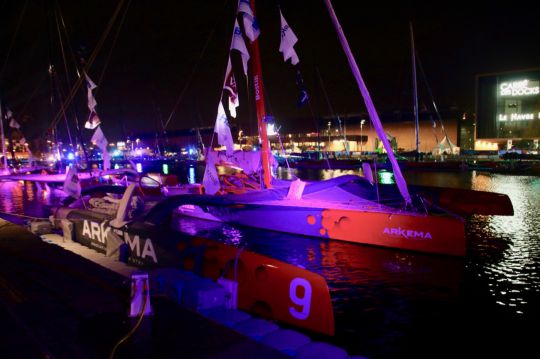
What's your life going to be like during this race?
It's gonna be 24 hours a day. I think I'm gonna sleep less than they do, but a lot more comfortably!
Does the router share the emotions of the skippers?
I'm happy when we're ahead. When Arkema did the Transat, Lalou broke his daggerboard and found himself against the winds, against the currents without his daggerboard in 35 knots to tack. It was laborious. I suggested he abandon, put on the indicator and go to Quebec City. Without a daggerboard, no one would blame him. But he said to me, " no, I want to go all the way ". When he crossed the finish line, he sent me the words " i never would have made it without you ". There was a victory behind that finish.
Sometimes they get so far into the red - especially when sailing alone - they get so tired that they are no longer lucid. With my solo past, I very quickly spot these moments and I say to him, " you don't understand anything anymore, you're going to eat, you're going to change and you're going to bed. You're cold, you're wet so we'll stop playing. You take a sweetbread and you go to rest. We'll talk again in two hours and we'll see how we attack the next because now it's dangerous ". These phases are not numerous, but when I spot them, there has to be a pause. Maybe it's because he's mismanaged himself before. But when I get to that moment, when he answers me next door and he's drunk with fatigue, we stop playing.
In the Transat Jacques Vabre, it's going to be a bit different, they're sailing double-handed, so they'll be less tired. Mummy's going to be on holiday for a while.
